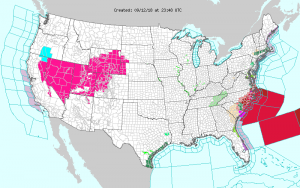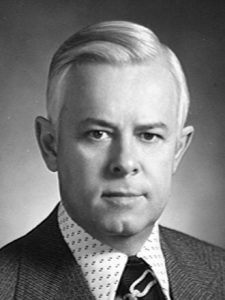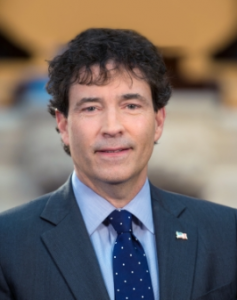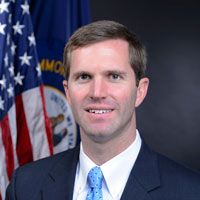 The Gheens Science Hall and Rauch Planetarium at the University of Louisville is holding a moonshine cocktail contest in advance of its October fundraiser, the Moonshine Mash Bash.
The Gheens Science Hall and Rauch Planetarium at the University of Louisville is holding a moonshine cocktail contest in advance of its October fundraiser, the Moonshine Mash Bash.
Anyone 21 years or older may enter the contest, which must feature a cocktail made using Jeptha Creed Original Moonshine. Spirits from Jeptha Creed, a family-owned craft distillery in Shelbyville, will be featured at an Oct. 19 fundraiser at the planetarium that celebrates the grand opening of the new Mary Ann Russell Science Education Exhibit featuring the moon. The winning cocktail will be served at the event.
Cocktail recipes must be submitted by Sept. 24 at 3 p.m. to planet@louisville.edu. Three finalists will compete in person Oct. 8, 1 p.m., at the planetarium. The media is welcome to attend the Oct. 8 event. Continue reading
Mandatory, Voluntary Evacuations in Place as Category 3 Storm Approaches
 Emergency officials on Wednesday urged millions of residents along the southeastern U.S. coast to finish preparations ahead of Hurricane Florence, which is expected to unleash damaging winds and life-threatening amounts of rain when it makes landfall this week.
Emergency officials on Wednesday urged millions of residents along the southeastern U.S. coast to finish preparations ahead of Hurricane Florence, which is expected to unleash damaging winds and life-threatening amounts of rain when it makes landfall this week.
Florence was at last report a Category 3 storm with maximum sustained winds of 195 kilometers (121 miles) per hour. Although it weakened slightly Wednesday afternoon, forecasters do not expect Florence’s strength to change much before it comes ashore near the North Carolina-South Carolina border.
The massive system was about 700 kilometers (435 miles) southeast of Wilmington, North Carolina. The National Hurricane Center said Florence was “forecast to be an extremely dangerous major hurricane when it nears the U.S. coast late Thursday and Friday.”
“This is not going to be a glancing blow,” the Federal Emergency Management Agency’s Jeff Byard said in Washington.
The governors of the Carolinas, Virginia, Maryland and Georgia all declared states of emergency.
Byard again urged residents in danger zones to heed warnings to either evacuate or hunker down. “There will be disruptions in our services,” he said. “The power will go off. Infrastructure will be damaged. Homes will be damaged or destroyed. So, again, the time to act is now.” Continue reading
 The surest way to create more and better jobs in Greater Louisville is for those of us who live and work here to buy locally whenever possible. To be clear, Louisville (like every region) is at its best when its local businesses are thriving and providing good jobs. The impact of local people patronizing locally-owned businesses simply can’t be overstated.
The surest way to create more and better jobs in Greater Louisville is for those of us who live and work here to buy locally whenever possible. To be clear, Louisville (like every region) is at its best when its local businesses are thriving and providing good jobs. The impact of local people patronizing locally-owned businesses simply can’t be overstated.
Studies indicate that independent and locally owned retailers and restaurants return about 55 percent of all their revenue to the local economy. Research by business data company Civic Economics suggests the large big-box chain stores recirculate only about 13 percent of their revenue within the local markets that host its stores. While local independent businesses are usually easy to identify, it is important to remember that many of the smaller nationally-branded chains are actually operated by locally-based franchisees and appreciate your support.
Of course, most of our locally owned businesses are also small businesses. There are about 57,000 businesses in the Louisville MSA with the vast majority locally-owned small businesses and proprietorships. These local small business owners and their employees are our neighbors, community volunteers and youth league coaches.
Though a shopper may occasionally save money by purchasing from big national chains, there are tradeoffs to consider. Consider the added cost placed on the environment when we purchase items that are produced faraway, then transported to this area. Food shipped cross-country carries a much greater environmental impact than food grown on a nearby farm. And who could ever argue against the taste of locally grown farm products when compared to canned goods or produce shipped in from the coasts? Continue reading
William Marvin Petty, M.D., Research Fund will support next step for promising research to improve pancreatic islet cell transplantation success
 JoAnn Joule’s father, William Marvin Petty, M.D., suffered from diabetes for many years. A 1952 graduate of the University of Louisville School of Medicine, Petty served as Jefferson County Coroner from 1962 to 1974 and was a family physician in Fern Creek for 43 years.
JoAnn Joule’s father, William Marvin Petty, M.D., suffered from diabetes for many years. A 1952 graduate of the University of Louisville School of Medicine, Petty served as Jefferson County Coroner from 1962 to 1974 and was a family physician in Fern Creek for 43 years.
Joule’s son lives with type 1 diabetes.
To honor her late father and help improve the lives of those with type 1 diabetes, Joule has given $500,000 to the University of Louisville Foundation to establish the William Marvin Petty, M.D., Research Fund. The fund is designated to support type 1 diabetes research at the UofL School of Medicine.
“I saw the toll diabetes took on my dad, and now my son is faced with the same disease,” Joule said. “I was not happy that medical research has not come up with anything new in the 40 years my son has been suffering. I am putting my assets behind the UofL research team.”
That research team includes Haval Shirwan, Ph.D., and Esma Yolcu, Ph.D., of the UofL Department of Microbiology and Immunology, who are working to develop techniques to prevent and treat type 1 diabetes with particular focus on transplantation of islet cells.
Type 1 diabetes is a chronic autoimmune disease in which the pancreas does not produces enough insulin, a hormone required to convert glucose to energy in the body. There is no cure for type 1 diabetes, and standard treatment involves regular injections of insulin, which is far from keeping blood sugar in balance.
Insulin is produced in the pancreas by a type of cells called islet cells. Individuals with type 1 diabetes have too few or altogether lack the type of islet cells that produce insulin to keep glucose at the proper level. In recent years, physicians have developed a treatment in which they transplant the needed islet cells into a patient. However, the patient’s immune system often rejects the transplanted islet cells over time, attacking and killing them. To keep the transplanted cells alive, patients must take immunosuppression medications, which have a number of undesirable side effects. Continue reading
Two scholars who research Native American culture, music and literature will share their sounds and insights in free, public talks this fall at the University of Louisville.
Both speakers are Anishinaabe, indigenous people of the Great Lakes region of the United States and Canada.
The Commonwealth Center for the Humanities and Society is offering the lectures in partnership with other units of the College of Arts and Sciences.
Here are details:
Sept. 13 – “Anishinaabe Translations of Global Literature,” with poet Margaret Noodin, University of Wisconsin-Milwaukee associate professor of English and director of the Electa Quinney Institute for American Indian Education. Noodin will talk about the way indigenous languages contribute to the way people understand literature; her current project is translating works of authors including Geoffrey Chaucer and William Shakespeare into her native language. The 4-6 p.m. event in Room 100, Bingham Humanities Building, is co-hosted by the humanities doctoral program.
Oct. 11 — “Indigenous North America – Hip-hop and Modernity,” with Kyle Mays, University of California-Los Angeles assistant professor of African American studies and author of a book about the topic. Mays will draw from his black and Saginaw Anishinaabe heritage in exploring the cultural and political significance of Native American and indigenous hip-hop artists’ work in challenging colonialism. The 4-6 p.m. event in Room 300, Bingham Humanities Building, is co-hosted by the history, English, Pan-African studies and comparative humanities departments.
For more information, contact Brandon Harwood at 502-852-7140 or Brandon.harwood@louisville.edu.
 A closely watched special election for a U.S. House of Representatives seat in the state of Ohio was too close to call Wednesday, as Republicans and Democrats weighed the results of that race and primary voting elsewhere in the country looking for signs of how national midterm elections might go in November.
A closely watched special election for a U.S. House of Representatives seat in the state of Ohio was too close to call Wednesday, as Republicans and Democrats weighed the results of that race and primary voting elsewhere in the country looking for signs of how national midterm elections might go in November.
With all precincts reporting, Republican Troy Balderson led Democrat Danny O’Connor by about 1,700 votes. Ohio’s Secretary of State said more than 3,400 provisional ballots and 5,000 absentee ballots were cast, but that under state law officials cannot begin counted them until 11 days after Tuesday’s election.
The winner fills a seat vacated by Republican Pat Tiberi, who announced his resignation in October 2017. He would have been up for re-election in November, meaning voters will again choose between Balderson and O’Connor in three months.
President Donald Trump used Twitter to take credit for what he said was a “great win” for Balderson.
“After my speech on Saturday night, there was a big turn for the better,” Trump said. “Now Troy wins a great victory during a very tough time of the year for voting. He will win BIG in Nov.”
Balderson thanked Trump as he spoke to his supporters late Tuesday and said he was ready to work for the people of Ohio’s 12th Congressional District.
“America is on the right path and we’re going to keep it going that way,” he said. “It’s time to get to work. Over the next three months. I’m going to do everything I can to keep America great again.”
A Republican has represented the district since the early 1980s, and O’Connor told his supporters he had done well in an election pundits did not think he could win.
“We went door to door, we went house to house, we made our case for change,” he said. “We’re gonna make that case tomorrow, we’re not stopping now. Tomorrow we rest and then we keep fighting through to November. Let’s go out there, let’s get it done, let’s change the country.”
In the November election, all 435 House of Representatives seats, 35 of 100 Senate seats, and 36 of 50 governors’ offices will be up for election.
Democrats must win 23 seats in the House and two seats in the Senate to gain control of those chambers.
There have been nearly a dozen special elections since last year, and while Republicans have won far more times than Democrats, the Democratic candidates have generally seen big improvements in their support compared to how the party did in the same areas in the 2016 election.
In the Midwest state of Kansas, the Republican primary for the party’s candidate for governor in November featured a tight race between Secretary of State Kris Kobach and the incumbent Governor Jeff Colyer. Each candidate had about 41 percent of the vote with 88 percent of precincts reporting.
Trump used Twitter to urge people in Kansas to vote for Kobach, noting he was “a strong and early supporter of mine.”
Trump also threw his support behind John James in the Republican primary for a Senate seat representing the state of Michigan. James defeated Sandy Pensler 55 percent to 45 percent in that race Tuesday. James will face incumbent Sen. Debbie Stabenow.
The Democratic race for governor in Michigan tested the electoral power of the party’s progressive wing. But the more moderate former state Senate leader Gretchen Whitmer easily defeated health director Abdul el-Sayed, who was trying to become the country’s first Muslim governor.
In the Republican race, Michigan Attorney General Bill Schuette, another Trump ally, handily won a race that featured Lt. Gov. Brian Calley.
Democrat Rashida Tlaib is set to make history in January as the first Muslim woman in Congress. She won the Democratic primary for Michigan’s 13th Congressional District for the November election in which there will be no Republican challenger.
 Attorney General Andy Beshear recently announced his office is returning over $12 million to state and federal Medicaid programs to resolve multistate claims that pharmaceutical company Mylan Inc. violated federal law by knowingly misclassifying EpiPen and EpiPen Jr. as a generic drug to avoid paying higher rebates owed to Medicaid.
Attorney General Andy Beshear recently announced his office is returning over $12 million to state and federal Medicaid programs to resolve multistate claims that pharmaceutical company Mylan Inc. violated federal law by knowingly misclassifying EpiPen and EpiPen Jr. as a generic drug to avoid paying higher rebates owed to Medicaid.
Under the $12.2 million Kentucky settlement, $8.5 million will be returned to the federal Medicaid program and $3.7 million will be returned to Kentucky’s Medicaid program.
“Medicaid and its expansion provide a critical service that helps Kentucky’s most vulnerable citizens,” Beshear said. “As Attorney General, I am committed to holding any company that defrauds Medicaid accountable. The actions of companies like Mylan defraud not only the government but the people government serves.”
According to the $465 million nationwide settlement, Mylan demanded massive price increases in the private market while avoiding its corresponding rebate obligations to Medicaid from 2010-2017 by erroneously reporting EpiPen as a generic drug despite the absence of any therapeutically equivalent drugs.
Federal law requires companies of single-source, or brand name, drugs to pay higher rebates to Medicaid.
Beshear’s Medicaid Fraud and Abuse Unit is charged with investigating and prosecuting any health care provider who fraudulently bills or abuses the Medicaid system.
To date, Beshear’s office has obtained settlements that will return over $64 million to taxpayers through recoveries of state and federal Medicaid funds, Medicare funds, and other funds through civil settlements and obligations of criminal restitution.
For more information or to report provider fraud, contact the Medicaid Fraud and Abuse Control Division at 877-228-7384.
 Weather
Weather Traffic
Traffic @LouisvilleDispatch
@LouisvilleDispatch @LouisvilleDisp
@LouisvilleDisp Subscribe
Subscribe